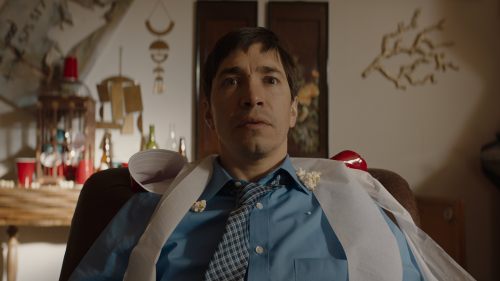Fantastic Fest Review: KNIVES AND SKIN Cuts Deep Into The Patriarchy
David Lynch is such a singular cinematic force that attempts to replicate him are fraught with compromising what makes Lynchian cinema tick. Lynch conveys such a specific mixture of suburban angst, surrealist kineticism, feminist musing, and idiosyncratic layered dialogue that referring to anything as “Lynchian” that doesn’t come directly from the man himself almost feels like a sacrilege. Writer-director Jennifer Reeder, however, has achieved something close to that impossibility with Knives and Skin, a film so completely immersed in Lynchian dialogue and delivery that it’s astounding how well Reeder was able to marry that style to her own neon-soaked feminist take on high school drama. Lynch may be on a pedestal, but Reeder certainly deserves a pedestal of her own after this.
To say that Knives and Skin lifts the inspiration of its premise from Twin Peaks is an understatement. Two teenagers go down to the middle of nowhere for sex, only for the confrontation to turn violent and for the young woman Carolyn Harper to pass out from blood loss on the gravel. Ostensibly the film is focused on the search for Carolyn by her classmates and their families, but how it plays out is more like a soap opera, with Carolyn almost acting as a background element to the dramatics of a suburban community.
Carolyn’s mother becomes obsessed with her daughter’s possessions as she deludes herself into believing that Carolyn must be okay somewhere. The town sheriff struggles to muster affection for his pregnant wife’s fetus. A teenage girl sells used panties to horny older men, including her principal. Her unemployed dad practices magic tricks in the quarry and has sex with the sheriff’s wife in full clown makeup. Romantic subplots cross the boundaries of high school cliques and heteronormativity. The boy who left Carolyn to die walks around with a perpetually bleeding bandage on his head.
At first it seems that these disparate plotlines are feeding too heavily into the style that worked so well for Twin Peaks’ serialized format, playing almost like a pilot for a television show that will never come to pass. However, once you become acclimated to the obvious Lynchian similarities, Knives and Skin shows itself to have a wickedly distinct persona. The neo-noir lighting and fabulously eccentric costume design bridge a gap between farce and teenage rebellion in a manner reminiscent of Heathers. Cast-performed choir renditions of pop staples provide eerie and contemplative atmosphere. The fact that all the apparently teenage characters are played by twenty-somethings is played for intentional comedy. The double meaning of characters’ cryptic dialogue will just as often punctuate as a joke as it does a profound observance. Multiple lines are instantly quotable, both for their absurdity and their poignance.
Most importantly, though, the mood of the piece eventually coalesces into a coherent whole, playing off themes of young female empowerment and pain unique to middle-age femininity. Not every character is relevant to finding Carolyn Harper’s body, but their stories are all relevant to one another, weaving a tapestry of the town’s residents that is held together by the experiences of its women. Knives and Skin is a wildly ambitious film that works not because of the art it cribs from, but almost in spite of it. It’s a film that inspires revisitation, not just to make more sense of this gorgeously dense world that Reeder has created, but to continue to live there, to laugh and love with these anti-archetypal people and their weird, unreal, incredibly human lives. If we’re going to hold surrealist suburbanist works to a so-called Lynchian standard, maybe it’s time to also hold them up to a Reederian one.



